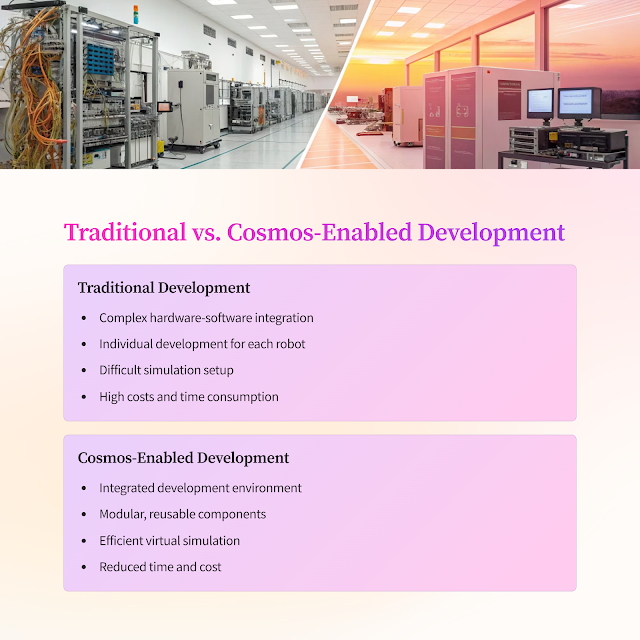The Future of Robotics: Physical AI and Cosmos Changing Development Paradigms!
Hello everyone! Have you ever imagined a day when robots seamlessly integrate into our lives, much like something out of a science fiction movie? I've always dreamed of robots since I was a child, but it always felt like a distant fantasy. However, recently encountering the concepts of Physical AI and Cosmos made me realize, 'Ah, this is what will truly accelerate the robot era!' Today, I'll share my journey of understanding how these two elements are reshaping the landscape of robot development, explaining it in an easy and engaging way. 😊
What is Physical AI? The Evolution of a Robot's 'Brain'! 🧠
When we think of AI, we usually imagine software AI that works intelligently within computers, like AlphaGo playing Go or ChatGPT writing text. But Physical AI literally refers to AI that interacts with the physical world. It's like having a robot's 'body' and 'brain' connected as one, allowing the AI to learn and act by directly seeing, hearing, and touching its surroundings. What an incredible concept!
To put it simply, while traditional robots were more like 'puppets' that moved according to predetermined commands, robots equipped with Physical AI are more akin to 'intelligent living beings' that can perceive, judge, and learn from their environment to move flexibly. This truly marks a significant shift!
The core of Physical AI is that robots collect data by interacting with the physical environment in real-time, and then learn and evolve autonomously based on this data. It goes beyond simply executing code; it's about learning through experience, much like humans do.
Cosmos: The Key to Solving Robot Development Complexity 🔑
Even with incredibly smart Physical AI, the process of developing robots remained complex and challenging. Integrating robot hardware and software, testing in various environments, and fixing issues was a huge hurdle. This is where Cosmos comes into play!
Cosmos is essentially an integrated platform for robot development. Just as we use a Software Development Kit (SDK) to create smartphone apps, Cosmos gathers everything needed for robot development in one place. What's more, it enables different robots and AI models to communicate and collaborate seamlessly. Isn't that truly revolutionary?
| Traditional Robot Development vs. Cosmos-Enabled Development |
|---|
|
Traditional Robot Development: - Complex hardware and software integration - Individual development needed for each robot - Difficulties in setting up simulation and testing environments - High development costs and time consumption |
|
Cosmos-Enabled Development: - Provides an integrated development environment - Modular components for easy development - Maximizes efficiency with virtual environment simulation - Significantly reduces development time and cost |
How Physical AI and Cosmos Are Changing the Robot Development Paradigm 🚀
When these two technologies meet, they create incredibly powerful synergy. The biggest change I foresee is the 'democratization of robot development.' What was once only possible for large corporations or research institutes can now be attempted by many more developers and startups, much like the boom in smartphone app development!
- Accelerated Development: Thanks to Cosmos's modular environment, the time needed to develop and test specific robot functions is dramatically reduced.
- Cost Reduction: The ability to test and verify in a virtual simulation environment first saves significant costs on actual hardware production and testing.
- Emergence of Diverse Robots: As the entry barrier lowers, we'll see a surge of robots with various forms and functions that we couldn't even imagine. Personalized robots could become a reality!
- Potential for Collaborative Learning: Within the Cosmos platform, multiple robots can share data and learn together, leading to an explosive growth in the intelligence of the entire robot ecosystem.
Even with advanced technology, ethical and societal issues can always arise. The increasing autonomy of robots, changes in employment, and data security concerns are challenges we must continuously address and resolve.
Example: Kitchen Robot Development Simulation 📝
Imagine developing a kitchen robot using the Cosmos platform. Developers can virtually build a complex kitchen environment and simulate the robot's process of recognizing ingredients, chopping, and cooking. It's like building a game stage!
- Step 1: Environment Setup
Within Cosmos, configure a virtual environment by selecting kitchen sizes, shapes, ingredients, and cooking tools. - Step 2: Robot Behavior Learning
Apply a Physical AI model to the robot and have it practice cooking thousands, even tens of thousands of times in the simulation environment. For example, by training it to 'chop onions,' the robot will autonomously learn the most efficient way to chop onions of various sizes and shapes. - Step 3: Error Correction and Optimization
If the robot drops ingredients or makes a chopping mistake during simulation, Cosmos analyzes this data and automatically improves the AI model, all without risking damage to a real robot!
Developing in this way makes it possible to create much faster, safer, and smarter robots. Isn't that something to look forward to?
Key Takeaways: Physical AI & Cosmos in Robotics
Frequently Asked Questions ❓
Wow, talking about these technologies truly makes them seem exciting and promising, doesn't it? The paradigm shift in robot development brought about by Physical AI and Cosmos will likely exceed our wildest imaginations. While there will certainly be challenges to overcome, I truly believe that robots will make our lives richer and more convenient! If you have any more questions, feel free to ask in the comments! 😊








